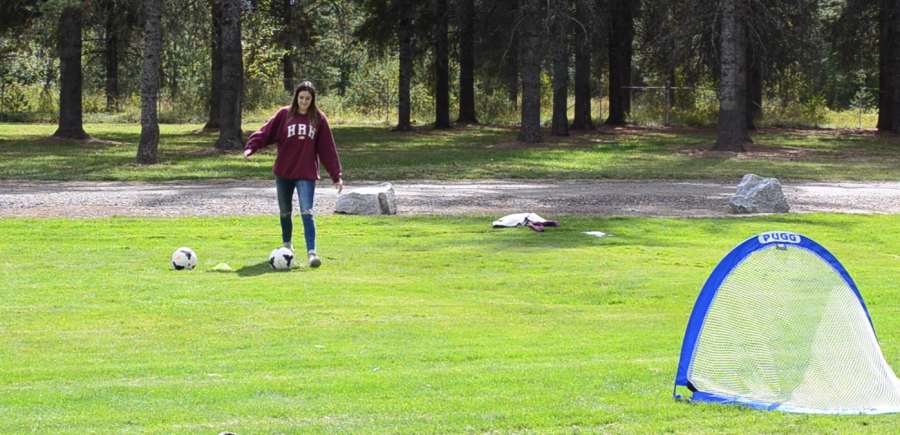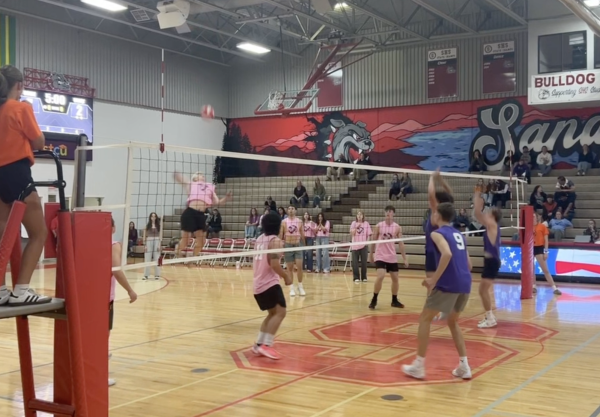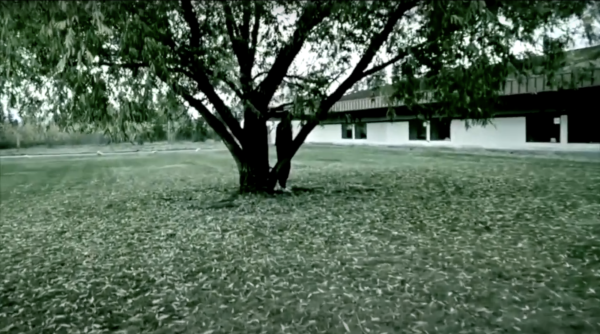FINDING MOTIVATION
A multimedia look at mental toughness and how you can improve your approach to tough tasks
Performance Psychology is a new class teaching students how they can perform better in stressful situations. The class regularly puts students in stressful situations, such as having to make a goal in soccer, to see how students react to the pressure.
Where does mental toughness come from?
Students in the Performance Psychology class are learning about this question as the push themselves to do things they did not think possible. The students — and instructors — went through a mini-boot camp of sorts this April to see in part where their breaking point was at.
For some students, it was before the activity even started. For others, they learned that our minds can be the barrier keeping us from achieving our goals.
Mental strength, stamina or toughness is defined by one sports psychologist as “the ability to consistently perform toward the upper range of your talent and skill regardless of competitive circumstances.”
These circumstances can include physical exhaustion, failure, doubt, frustration and the many other mental obstacles that athletes face.
Mental strength is something that coaches in Sandpoint deal with throughout their respective seasons.
The Cedar Post asked two coaches, Chase Tigert and Kent Leiss, what they think defines mental toughness and whether it has changed over generations.
Mental toughness is a characteristic students can develop and enhance with practice. Here are are six strategies experts say can strengthen mental toughness when someone faces of adversity.
Create a Mantra
A mantra is a word or a phrase that prompts your brain to persevere through pain, exhaustion or doubt in the face of challenge. It can be as simple as “I can do this” or it can be something more personal like a name or expression that reminds you of a reason to press on.
Often times, athletes’ mantras are something powerful that evokes an emotion, reminds them of the end result, reminds them of their self worth or ultimately anything that motivates them. To help come up with a mantra, you can consult the internet for common ones, or ask coaches or teammates if they have mantras of their own.
The most important part of developing a mantra is testing it in a real or simulated situation that challenges your mental toughness.
Try Meditation to Improve Mindfulness
One of the keys of mental stamina is mindfulness, or being present in the moment and being able to recognize what you are feeling. This can be a lot more difficult than it sounds because of the automatic urge to dwell on past mistakes or overthink the end result of an event.
Practices that help people develop mindfulness include meditation and breathing exercises, as it trains your mind to bring conscious attention to the present moment. Meditation is scientifically proven to improve resilience to adversity and this is vital for high pressure, high intensity situations.
For an athlete to be focusing their attention on anything besides the present moment, it can be detrimental and can cause feelings of doubt and defeat.
Put Yourself in Challenging Situations
Often times, the mental strength that you need to have in that championship game, on the last lap or the tie-breaking match is not something that can be duplicated. However, putting yourself in situations that are close to this amount of pressure or exhaustion will help build your mental stamina, and willpower to continue during times like this.
Some ways to mimic the feeling are by pushing yourself in practice or conditioning to the point at which you feel like giving up, and attempting to train your brain to push through the pain. To mimic the pressure of events like this is more difficult, but can be done by giving yourself incentives.
For example, if you are trying to break your personal record or practice penalty kicks, give yourself a negative incentive if you fail, such as more conditioning.
Create a Routine
Mental stamina is not only persevering through pain and frustration, but also being able to stay collected under pressure.
One way to cope with the stress of a high pressure situation is to create a routine that you follow to calm your nerves and give you confidence. A pre performance routine is a sequence of specific actions, thoughts or words that you repeat before you take the field, court, or course.
One of the best examples for a routine is penalty kicks in soccer. Many soccer players have developed a routine, such as counting steps or breaths, to help them feel prepared before they take a shot.
Talk to Yourself in a Positive Way
Optimism and positive self-talk is one of the simplest, yet most challenging strategies that help athletes form a resilient, and mentally strong attitude.
When a sporting event has gotten tough or the athlete feels like they have failed, it is very easy to doubt yourself or let your mind slip into a negative mentality. Try speaking positively, in your head or out loud, to yourself in your daily life and this attitude will become natural.
The more you build yourself up during everyday challenges like taking a test or feeling disorganized, the easier it will be to convince yourself during sports.
Although positive self talk can correlate with a mantra, it is not a specific phrase, but rather an overall positive outlook on failures, losses, and struggles as you attempt to perform at your peak.
Take Performance Psychology
One of the best ways to improve your mental toughness is to educate yourself on exactly what that entails and the psychology behind it.
Sandpoint High School offers a class, taught by Scott Fitchett and Conor Baranski, that explores the ins and outs of performance psychology and mental toughness. The class covers topics much like the ones on this list, including deliberate practice, routines, mantras, meditation, etc. and allows students to see these ideas demonstrated and applied.
The class also provides students the opportunity to put themselves in embarrassing and uncomfortable situations that mimic the pressure and obstacles of a sporting event. If you take this class with an open mind, it is very likely that you will gain important knowledge and strategies for how to improve your willpower.

Riley Walkington is a senior and it is her second year on staff. Here are some fun facts about Riley.
What’s the most annoying question people frequently...

Jezza Hutto is a senior and it is her second year on staff. Here are some fun facts about Jezza.
What are you freakishly good at?
I'm freakishly...

Mason Bangeman is a senior and it is his first year on staff. Here are some fun facts about Mason.
What’s the last movie you cried at?
Marley...

Corinne Capodagli is a senior and it is her second year on staff. Here are some fun facts about Corinne.
What word do you repeat at least 10 times a...











